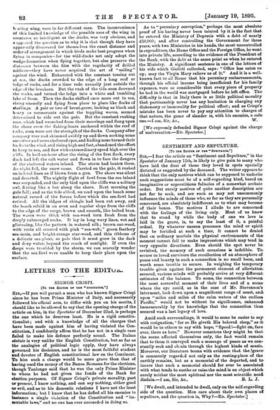SENTIMENT AND SEPULTURE.
[To TEL EDITOR OF THZ " EIFICFATOR:J fear the article on "Sentiment and Sepulture," in the Spectator of January 12th, is likely to give pain to many who- have laid the dust of those they loved in spots specially dictated or suggested by the deceased. The writer appears to- think that the only motives which can be supposed to underlie- such suggestions must be of a self-regarding kind, based on imaginative or superstitious fallacies of a somewhat archaic order. But surely motives of quite another description are not far to seek, and are such as may not uncommonly influence the minds of those who, so far as they are personally concerned, are absolutely indifferent as to what may become- of their bones. The motives I allude to are concerned with the feelings of the living only. Most of us know that to stand by while the body of one we love is, laid in the grave, is, to say the least of it, a painful ordeal. By whatever unseen processes the mind or spirit may be fortified at such a time, it cannot be denied that on ordinary mortals the physical environments of the,- moment cannot fail to make impressions which may tend in very opposite directions. Even should the spot never be- revisited, the memory of such occasions is indelible. To, secure to loved survivors the recollection of an atmosphere of peace and beauty in such a connection is no small boon, and worth some trouble to secure. In weighing the temporary trouble given against the permanent element of alleviation: secured, various minds will probably arrive at very different estimates of the balance. To some, the connection between the most sorrowful moment of their lives and of a scene where the eye could, as in the case of Mr. Stevenson's interment, look down upon a magnificent range of coast, and upon "miles and miles of the calm waters of the endless Pacific," would not be without its significance, enhanced, immeasurably by the knowledge that the connection thus secured was a last legacy of love.
Amid such surroundings, it would to some be easier to say with resignation, " for so He giveth His beloved sleep," as it would be to others to say with hope, "Speed !—fight on, fare ever, there as here." However conscious they might be that. the scene affected themselves only, the fact would remain that to them it conveyed such a message of peace as we con- stantly seek and ob:ain through the highest kinds of music. Moreover, our literature teems with evidence that the !grave is commonly regarded not only as the resting-place of the earthly remains, but as a memorial of the departed, and to- insure that such a memorial should for ever be associated with what tends to soothe or raise the mind is an object which surely neither the most spiritual nor the most scientific need [We dwelt, and intended to dwell, only on the self-regarding side of the question. Men care about their own places of sepulture, and the question is, Why P—En. Spectator.]


































 Previous page
Previous page